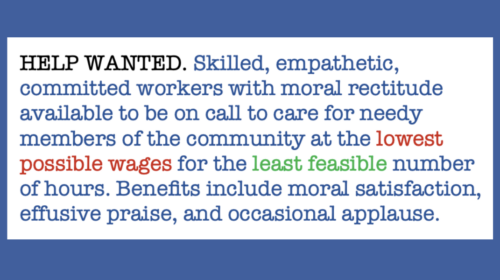Care Talk

Claudia and Care
Hearty applause for the honor paid to this year’s winner of the Nobel Prize for Economics should be combined with a critical look at her work.

The Uncaring Rewards of Paid Care
Field research conducted in Teeside in northeast England highlights the links between precarity and low pay for workers providing long-term care.

Caregiving Skills for the Planet
Reflections on why we need to consider social and ecological caregiving together.

How a Dashboard on the Care Economy Came to Be
The Care Board will provide a dashboard of comprehensive statistics on the U.S. care economy built from the vantage point of caregivers.

Can Child Care Legislation Increase Women’s Participation in the Paid Labor Force?
This comparative global analysis links to a paper with impressive empirical details and answers “Yes.”

Precarity and Care
Far from opposites, care and precarity are deeply entwined both etymologically and historically. Now, the increasing precarity created by current labor markets fosters a higher demand for care.

Carework Network Summit in Costa Rica
For the first time since the Covid-19 lockdown, the Carework Network convened an in-person summit — this time with a fully bilingual gathering of academics, activists, and policymakers in San José, Costa Rica.

Care Talk 2.0
Welcome to Care Talk 2.0! In February 2008, economist Nancy Folbre launched the original Care Talk blog to reflect on research and policies regarding paid and unpaid carework. Written in a style that made material accessible to journalists, policymakers, and students as well as more seasoned researchers, the blog began with a focus on how to measure the economic contributions of unpaid care, the limitations of commercial models for care provision, and the problems that plague US systems of care provision.

The Escalating Cost of Care Services
Price of three major care services–day care and preschool, nursing homes and adult daycare, and medical care services, have risen much faster since 1998 than the price of the “all items” basket of goods and services that serves as the primary benchmark for analysis of inflation

Justice in the Balance
Instead of trying to walk the tightrope known as work family balance, maybe we should seek work family justice—something we all deserve rather than something we are easily blamed for not achieving on our own.
From Dobbs v. Jackson to Rights v. Obligations
What’s wrong with Ross Douthat’s interpretation of the world in general and abortion rights in particular?
Social Capital vs. Social Climate
Social capital is a delightfully contradictory concept, which explains why academics kind of like it: So much room for elaboration and disputation, both qualitative and quantitative!